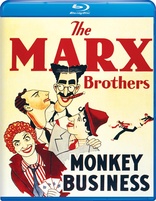Monkey Business Blu-ray Movie
HomeMonkey Business Blu-ray Movie 
Universal Studios | 1931 | 78 min | Not rated | Nov 07, 2023Movie rating
7.3 | / 10 |
Blu-ray rating
| Users | 0.0 | |
| Reviewer | 4.0 | |
| Overall | 4.0 |
Overview
Monkey Business (1931)
On a transatlantic crossing, the Marx brothers get up to their usual antics and manage to annoy just about everyone on board the ship.
Starring: The Marx Brothers, Groucho Marx, Harpo Marx, Chico Marx, Zeppo MarxDirector: Norman Z. McLeod
| Comedy | 100% |
Specifications
Video
Video codec: MPEG-4 AVC
Video resolution: 1080p
Aspect ratio: 1.33:1
Original aspect ratio: 1.2:1
Audio
English: DTS-HD Master Audio 2.0
Subtitles
English SDH, French
Discs
Blu-ray Disc
Single disc (1 BD)
Playback
Region A (B, C untested)
Review
Rating summary
| Movie | 4.0 | |
| Video | 4.0 | |
| Audio | 3.5 | |
| Extras | 2.0 | |
| Overall | 4.0 |
Monkey Business Blu-ray Movie Review
Reviewed by Jeffrey Kauffman October 16, 2016Note: This film is available as part of The Marx Brothers Silver Screen Collection.
The Marx Brothers remain one of the most iconic comedy teams in the entire history of show business, including of course their film work. Years of
vaudeville experience and then Broadway stardom meant the siblings came to cinema with personas largely set and with a huge “catalog” of bits they
could utilize for their film work. That said, the movie going public had never really seen anything like the manic proclivities of this familial troupe, and
countless commentators from 1929 (when The Cocoanuts debuted on celluloid) on have attempted to analyze various elements of the
team’s completely unique comedy. While perhaps not especially “meaningful” in any overarching way, I had an unusual response to watching these
new transfers of the first five Marx Brothers feature films (all reportedly sourced from new 4K restorations done by Universal), one probably sparked
by my recent reviewing duties.
Arrow Video’s UK branch recently released
Woody Allen: Six Films 1971-1978, and in doing some background reading in preparation for my reviews of the movies in that set,
more than once I read in various articles comments along the lines of “Allen helped to define Jewish humor” or “Jewish humor simply wouldn’t be
the
same without Allen.” Allen’s patented brand of neurosis, sexual obsession and verbal acuity may indeed be at least a trifecta of Jewish
humor if not the trifecta, but one only need look a bit further back in time to the Marx Brothers for another potent example of the
“mainstreaming” of elements that could well be considered Jewish humor. I'm not suggesting this is the only way to look at the Marx Brothers'
efforts, or even that it's an "important" way, just that it struck me as "being there" for me after having just watched a bunch of Allen films.
In a way, though, the Marx Brothers’ perceived “Jewishness” is a little
more subliminal than Allen’s is in his own films, though for those with the eyes to see, the siblings represent their generation of Jews rather
iconically.
Not only is their verbal humor full of puns and other formalistic hijinks, the very subject matter of many of their jokes tends to focus on social,
political and even economic elements. The very fact that the act is comprised of family is important, with a “me and you against the world”
ambience
that speaks to outcasts (obviously including Jews) to this day. But there’s a “subtext” to many of the early Marx Brothers films, where the
brothers
are the outsiders, virtual interlopers attempting to make sense of a calamitous “new” world, whether that be a hotel, high society, a passenger
ship,
college sports or even a supposed nation in the throes of financial ruin.
What’s fascinating about the early Marx Brothers efforts is how they very
subtly display signs of the assimilative fervor that many first or second generation Jews of that time period experienced, where it became
paramount
(no pun intended, considering the studio which released the early Marx Brothers efforts) to “blend in”. That may seem positively non-intuitive,
given
the Marx Brothers’ predilection toward anarchic behavior and just outright silliness, but when seen through the prism of an early to mid 20th
century
“Jewish identity,” the first five Marx Brothers feature films offer not just laughs galore, but a rather interesting example of so-called “ethnics”
rather
brilliantly invading the American consciousness in an almost subversive way. In this respect, the Marx Brothers become one of the most potent
examples
of what might be termed cultural immigration, where their Jewishness may have been slightly cloaked but no less ingratiating in the long run.
That
“cloaking” may be nowhere more obvious than in the persona of Chico, a Marx who spoke with a faux Italian accent and who seemed to be
something of a grifter at times. Cloaked in another way but perhaps arguably more ostensibly Jewish, at least on one interpretive level, was Harpo,
the weirdly childlike mute who seemed
to
often be the hapless scapegoat in many of the films, the outsider whose very powerlessness (as evidenced by his inability or unwillingness to
speak)
created “problems,” albeit often in a comedic way. The most obvious paradigm of Jewishness is of course Groucho, with his hyperarticulate
verbal
humor and a probably more than slightly lecherous mien which may in fact be a precursor for some of Woody Allen’s more sexually charged
material.
Zeppo, the kind of “forgotten” Marx Brother, and the one whose film persona is probably the blandest, may therefore somewhat ironically be seen as
the best symbol of those
aforementioned assimilative tendences—Zeppo had “learned” how to be an American first, blending in as the troupe’s straight man and therefore
almost seeming like an outsider himself, at least within the insular world of the siblings’ relationships.
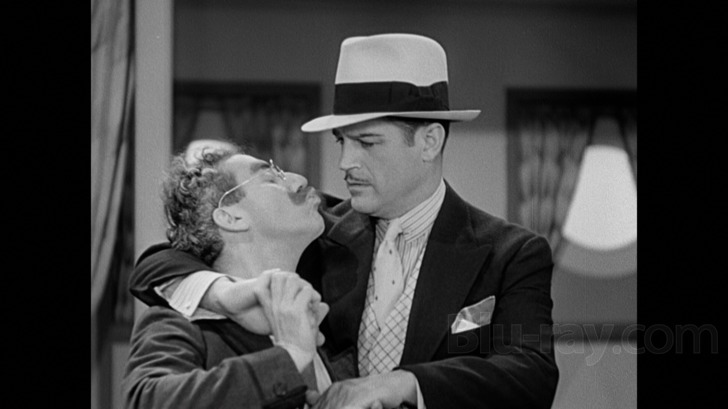
Monkey Business marked a departure for the Marx Brothers in a couple of important ways. This was their first “original” film, one not based on a pre-existing Broadway property, and it also was the first film they shot in good old Hollywood (the first two were shot on the east coast at what is now known as the Kaufman Astoria Studios). This is also a film where the screenplay dispenses with such “non essentials” as character names for the brothers, and the siblings are pretty much simply playing themselves (not that they ever did otherwise, even when they were granted character names). Finally, regular Marx Brothers foil Margaret Dumont is not on hand in this film, “replaced” in a manner of speaking by Thelma Todd (who also shows up in the next Marx Brothers film, Horse Feathers ). Once again, “plot” dynamics are variable at best, with the brothers portraying stowaways on an ocean liner on a transatlantic crossing.
A bit of Jewish subtext might be apparent in the brothers’ “entrance” in this film, as they’re heard singing from a bunch of barrels labeled “kippered herring.” The boys spend the rest of the film attempting to hide from the ship’s crew (who act as a kind of bumbling Keystone Cops aggregation), while also splitting into “opposing camps” working for two different hoodlums who are also on the cruise, Big Joe Helton (Rockcliffe Fellowes) and Alky Briggs (Harry Woods). A couple of romantic subplots intrude, including a typically lecherous Groucho chasing after Briggs’ wife Lucille (Thelma Todd), and Zeppo taking off after Helton’s daughter Mary (Ruth Hall), who becomes a "damsel in distress" late in the film.
While not quite as uneven as The Cocoanuts, Monkey Business shows signs of having been stitched together from a number of different elements, including older bits the brothers had no doubt been developing for years. Still, the film is relentlessly funny and often patently bizarre (as in the best Marx Brothers tradition). A couple of set pieces are among the best in the entire Marx Brothers oeuvre, and the oft lambasted Zeppo actually gets the chance to do some real performing in this one.
Monkey Business Blu-ray Movie, Video Quality 
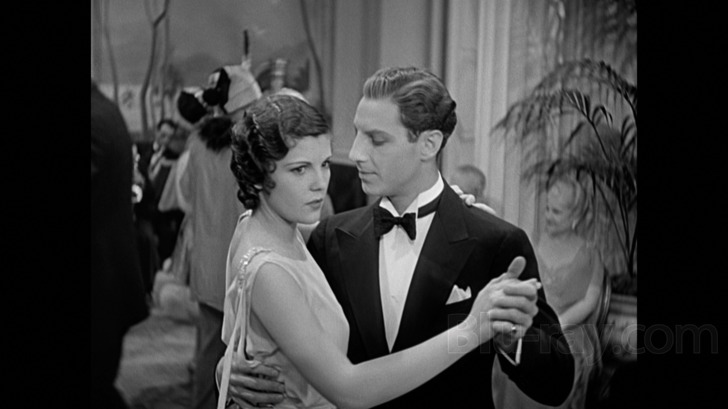
Monkey Business is presented on Blu-ray courtesy of Universal Films with an AVC encoded 1080p transfer in 1.33:1. Restorative efforts have only gone so far to improve the image here, though those with a home video history with this film will probably be generally very well pleased with the results. As is also the case with Horse Feathers (and is actually more the case with that presentation), grain resolution here is occasionally problematic, sometimes giving an appearance of vertical lines running up and down the image. What's more apparent in this transfer are the persistence of quite a few scratches, including several that are long both in length and duration (time wise). There are occasional warping issues (something that's again more of a problem with Horse Feathers), though it's a subtle anomaly at times. You can see the background "bend" slightly during the opening scene with the brothers in the fish barrels, but it crops up occasionally thereafter, including at circa 31:31. All of this said (and I do so from a potential overabundance of caution), things can look very good a lot of the time throughout the presentation. While not incredibly detailed in wide shots or even some midrange shots, this film finally starts employing at least some close-ups and detail levels are often quite good. Contrast is also consistent and black levels suitably deep. The final barn scene is among the best of this transfer, with really good detail levels and nice overall sharpness and clarity. My score is 3.75.
Monkey Business Blu-ray Movie, Audio Quality 
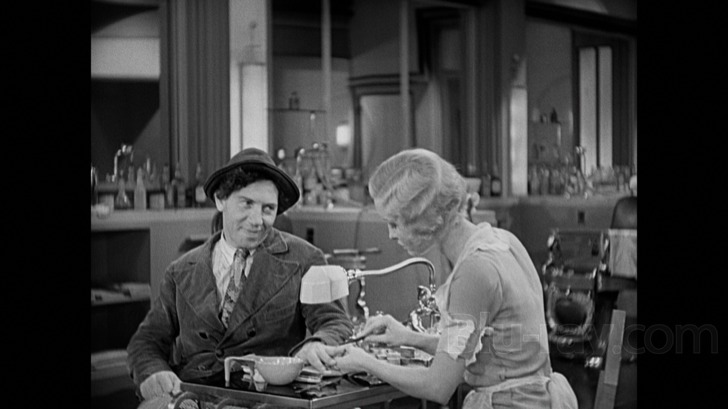
There's a noticeable uptick in audio quality with Monkey Business' DTS-HD Master Audio 2.0 mono track, which is not to suggest this is audio that is going to set anyone's heart on fire. A bit fuller midrange helps to expand the music and even the dialogue, and while there's still the unavoidably boxy sound of this era's recording technologies, things sound at least incrementally better throughout this presentation. There's also relatively less hiss and no real issues with pops or other distractions.
Monkey Business Blu-ray Movie, Special Features and Extras 
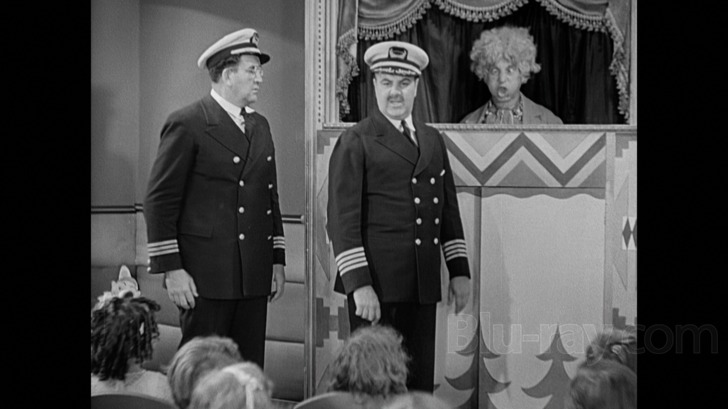
- Feature Commentary with Marx Brothers Historian and Author Robert S. Bader and Bill Marx (Harpo's son). This is probably the "sweetest" commentary in this set, since it features the first hand reminiscences of Bill Marx. That said, there's still sufficient "data" to satisfy those wanting tidbits on the shoot.
Monkey Business Blu-ray Movie, Overall Score and Recommendation 
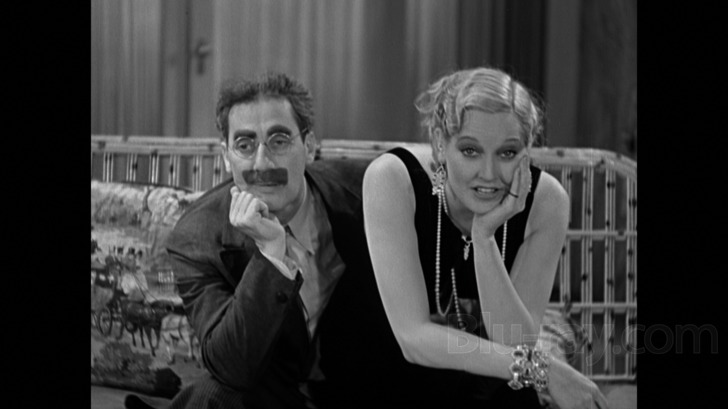
When Monkey Business is at its most lunatic, it equals (or at least comes close to) the best of the Marx Brothers, but there's still a slightly uneven comedic tone at times. While Groucho kind of starts to take center stage here (something he'd only increase with the next Marx Brothers film, Horse Feathers, Harpo especially has some great moments in the film. While video has occasional problems, this has one of the best commentaries in the set. Highly recommended.
Similar titles
Similar titles you might also like

The Cocoanuts
1929

Animal Crackers
1930

Duck Soup
1933

Horse Feathers
1932

Champagne
1928

Our Hospitality
Remastered
1923

The Navigator
1924

Sleeper
The Woody Allen Collection
1973

Triangle of Sadness 4K
2022

Easy Street
1917

A Countess from Hong Kong
1967

Spite Marriage
included with "The Cameraman" release
1929

The Lady Eve
1941

Speedy
1928

Sons of the Desert
1933

Bananas
1971

The Captain's Paradise
1953

The Impostors
1998

Trafic
Traffic
1971

Jour de fête
The Big Day / 1949, 1964, and 1995 Versions
1949
